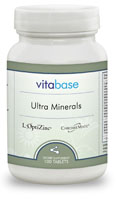Iodized salt is the primary dietary source of iodine. Plant and animal sea life, such as shellfish, white deep-water fish, and brown seaweed kelp, absorb iodine from the water and are great sources of iodine. Some seafood and sea vegetables are rich iodine. They include canned sardines, canned tuna, clams, cod, haddock, halibut, herring, lobster, oyster, perch, salmon, sea bass, and shrimp. Dulse, kelp, and seaweed are also sources of dietary iodine. Garlic, lima beans, sesame seeds, soybeans, spinach, Swiss chard, summer squash, and turnip greens are also good sources of this mineral. Bakeries may also add iodine to dough as a stabilizing agent, making bread another source of iodine.
|
 Minerals are divided into two classes: macrominerals and trace minerals. Macrominerals are needed in larger amounts than trace minerals. Ultra Minerals by Vitabase includes the macrominerals calcium, magnesium and potassium. Important trace minerals in our supplement are iron, iodine, zinc, selenium, copper, manganese, chromium, molybdenum, vanadium and boron. Many of the minerals are chelated which means they have been bonded to a protein molecule. This helps transport them to the blood stream and enhances absorption at the cellular level. Click here for more information.
Minerals are divided into two classes: macrominerals and trace minerals. Macrominerals are needed in larger amounts than trace minerals. Ultra Minerals by Vitabase includes the macrominerals calcium, magnesium and potassium. Important trace minerals in our supplement are iron, iodine, zinc, selenium, copper, manganese, chromium, molybdenum, vanadium and boron. Many of the minerals are chelated which means they have been bonded to a protein molecule. This helps transport them to the blood stream and enhances absorption at the cellular level. Click here for more information.